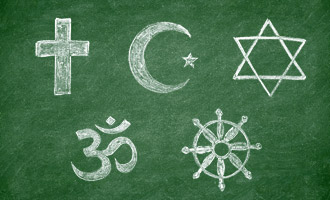I’ve just returned from a pilgrimage to the Holy Land. Led by Bishop Kevin Doran, 100 Irish pilgrims visited the sites associated with the earthly life of Jesus. It’s always a fascinating and moving experience.
As well as the Christian sites, that land is also holy to both Jews and Muslims and understanding this is key to appreciating how a potential peace deal can be reached.
To be ignorant of the role Faith plays in the lives of billions of people is to fail to understand and appreciate their worldview. What’s also dangerous about a lack of religious literacy and vocabulary is that those who lack it often don’t even know they lack it and therefore don’t see what they’re missing.
Closer to home, a new government proposal to shake-up primary education could see a reduction in time allocated to the teaching of religion.
The proposals are contained in a new draft primary curriculum framework that was published on Tuesday by the State advisory body the National Council for Curriculum and Assessment (NCCA).
Endeavour
Recent years have seen calls for faith formation – preparation for the reception of the sacraments rather than religious education – to become more of a parish-based endeavour. There are good reasons to argue that well-resourced parishes with talented and committed catechists can help deepen understanding of the sacraments.
The study of religion does need to be separated from faith formation”
But reducing education about religion and beliefs is a dangerous experiment at a time when religion is increasingly a lens through which to see and fathom the world. Downgrading the subject also deprives emerging generations of valuable tools to understand what makes the world go round and was a proven strategist for resilience.
The 21st Century has shown that far from being irrelevant, more and more people across the globe are becoming religious and Faith is an important backdrop to many challenges facing the world. Add to that the fact that the majority of immigrants coming to Europe – including Ireland – describe themselves as religious, and ignorance of religion means ignorance of the world around us. One doesn’t have to be religious to understand religion and know its importance in global affairs.
There is a body of basic religious knowledge that everyone should have. How many Irish teenagers, for example, leave school without having the slightest notions about distinctions within Islam? Do they know the difference between Sunni Islam and Shia Islam? What of Sufis and Salafism?
So what, you might say, what’s the big deal? Religion is a private matter, and sectoral interests within Islam (or any other religion) are of little interest in modern Ireland.
But, it is a big deal – to fail to understand some of the competing interests at the heart of contemporary Islam. How can you grasp the central thrust of movements such as so-called Islamic State without an awareness of religion distorted though it may be? To miss the fact that rivalry between Sunni Saudi Arabia and Shia Iran is at the heart of many of the lingering conflicts in the Middle East is to be ignorant of the volatile geopolitics of the region.
‘Nietzsche is dead – God’ points to a growing confidence amongst theists that their Faith has risen to the challenge”
The study of religion does need to be separated from faith formation. In the UK, if a school is Anglican, for example, that ethos is catered for quite apart from the religious studies department where the subject is treated as an academic discipline alongside other subjects like history or geography.
While Anglicanism is nominally the state religion of the UK, Britain could hardly be described as a confessional state – it is one of the most secular places in Europe, though it is a complex mix of people from many religious backgrounds and none. But what policymakers there understand is that religion plays an important role in society and in the lives of individual citizens – to fail to get this is to be tone deaf to something which means a great deal to many people.
So while the Government might trumpet the new decision as reflective of a more diverse Ireland, it is actually only pandering to a very small but vocal lobby of secularist organisations who are stuck in a time warp of believing that over time the world would move beyond religious beliefs.
Confidence
Nietzsche, Marx and Freud, all thought that religion would wither and die in the 20th Century. They were on the wrong side of history, and the undoubtedly apocryphal story of a theology student scrawling on the bathroom wall ‘Nietzsche is dead – God’ points to a growing confidence amongst theists that their Faith has risen to the challenge.
And they have reason to be confident. Religion is experiencing a global boom. Christianity may be on the retreat in Europe, and some people even predict that it is dying – North America may go the same way. But, what is actually happening is that the global centre of gravity is shifting towards Africa, Latin America and – increasingly – Asia.
If we’re serious about understanding the world and having mature and well-formed opinions about what is happening in the world, religion has to be part of the picture. Faith formation should be reserved for those who want it, but a worldview which doesn’t take religion into account is a very impoverished and one-dimensional outlook.
The NCCA is consulting on the Draft Primary Curriculum Framework. To add your voice to the conversation, see www.ncca.ie


 Michael Kelly
Michael Kelly Photo: Religious Freedom Centre
Photo: Religious Freedom Centre 